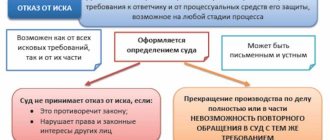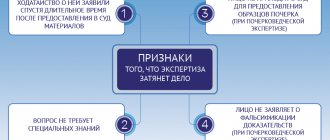Cassation in the arbitration process is the third stage of the proceedings, which follows after the end of the appeal hearing of the case. A cassation appeal is filed against the decision of the arbitration court of appeal. The process of reviewing an arbitration decision goes through several stages. The appeal is followed by cassation proceedings. A complaint is also written here, but in its own special form. The proposed new blog article is devoted to all the relevant subtleties.
What can a cassation be filed for?
Not all judicial acts are subject to the possibility of appeal. Here is a list of what a cassation can be filed for:
- the court order of the first instance, which received force;
- the first arbitration decision (with the condition that the higher court refuses to renew the deadline for filing an appeal);
- the initial court decision and (or) the results of its review by judges of the arbitration court of appeal.
When a case has been heard sequentially in the first instance and in the appellate procedure, an appeal is often filed against both verdicts at once. For example, if a claim was rejected, and the judges of the appellate panel agreed with this, then the original decision, as well as the appeal ruling, are appealed. But it also happens that the two previous solutions are diametrically opposed in content. Then, as a rule, the subject of a cassation appeal becomes the decision of a higher arbitration court. However, a party may ask the cassation court to uphold the decision that is beneficial to it.
Where to file a cassation
Many people are not clear where to file a cassation appeal.
Meanwhile, it is addressed to the cassation arbitration court, whose jurisdiction territorially extends to a certain district of the country. There are currently ten of them in total. The system of cassation courts can be found in the Federal Law on Arbitration Courts. In addition, an indication of the desired cassation court is always made in the decision of the appellate instance.
The cassation appeal is submitted to the court that made the contested decision. If the subject of cassation is acts of first instance and appeals, then the complaint is sent through the office of the appellate arbitration court.
Deadlines for cassation
As a general rule, the deadline for cassation is 2 months from the day on which the relevant decision comes into force. If we are talking about reviewing a decision from an arbitration court of appeal, then the date of its adoption is taken as the starting point. The court order becomes effective upon the expiration of the deadline for the debtor to file objections. Let us remind you that 10 days are allotted for this from the date of receipt of a copy of the document. If the time for filing a complaint was missed due to objective circumstances, the cassation authority has the right to restore the corresponding deadlines. However, there is one condition - the petition must be filed within six months from the date of entry into force of the document being appealed. When the author of the cassation has not previously participated in the case, then the above 6 months are calculated from the moment of receipt of information about the contested court decision (decisions).
Plenum of the Supreme Court: features of cassation in economic cases
The plenum, as usual, took place online. The project was presented by Supreme Court Judge Anatoly Pershutov. According to him, new clarifications of the rules of cassation proceedings in arbitration courts were needed because the old ones were adopted more than 20 years ago (Resolution of the Supreme Arbitration Court of September 24, 1999 No. 13), that is, even before the adoption of the new APC in 2002.
The new clarifications, according to Pershutov, are composed mainly of answers to questions that arise in the work of arbitration courts. The document should help achieve uniformity of practice when resolving procedural issues in cassation proceedings.
In parallel with the clarifications of cassation proceedings under the APC, the Plenum of the Supreme Court clarified the rules for considering cases on appeal. Read more about them in the material “The Plenum of the Supreme Court explained the appeal under the Arbitration Procedure Code.”
The version of the clarifications discussed is not final. Today the Plenum of the Supreme Court decided not to adopt the resolution; it was sent for revision. A link to the text of the draft clarification is at the end of the material.
1
Applicant verification
The Plenum of the Supreme Court reminds: sometimes a cassation appeal can be filed even by a person who did not participate in the consideration of the case in the first instance and whose complaint the appeal refused to consider. To do this, the applicant needs to inform the court that the contested judicial act affects his rights and obligations. If the complaint does not substantiate this, the cassation will be returned to the applicant.
Experts, specialists, witnesses and translators also have the right to appeal in cassation, but only in terms of payment of remuneration or reimbursement of expenses.
2
Bypassing the appeal
Some decisions do not provide for an appeal. The following can be appealed immediately in cassation:
- court orders;
- any judicial acts on cases considered by the Intellectual Property Rights Court as a court of first instance;
- decisions on applications for awarding compensation for violation of the right to a trial within a reasonable time or the right to execution of a judicial act within a reasonable time.
And in some cases it is impossible to complain to the cassation court at all. For example, when an appeal is returned or when proceedings on an appeal are terminated due to its refusal.
3
Contact address
The Plenum reminds that a complaint against a judicial act must be filed with the court that adopted it. If a cassation appeal is filed directly with the district court (or with the IP for “intellectual” disputes), then the court must return it to the applicant. True, in the event of such an error, the applicant will be given a small “benefit” and will be allowed to restore the deadline for filing a complaint with the appropriate court.
There is an exception to this rule. If a cassation appeal was received by the district court after it had accepted the case for proceedings on the complaint of another person, the court must, for the purpose of “procedural economy,” independently resolve the issue of accepting a new complaint.
4
Late wisely
If the court produced the full version of the decision too late and because of this the lawyers did not have time to prepare a cassation appeal, then the court can restore the deadline, but only at the request of the applicant.
Plenum of the Supreme Court: how to consider appeals in administrative cases
Often applicants are more late in filing a complaint than the court is in preparing a judicial act. “If the applicant has exceeded the time limit of a greater duration than the excess of the court term, then the court must establish whether the applicant had a sufficient period of time to prepare and file a cassation appeal within the period provided for by procedural legislation,” the Supreme Court emphasized.
5
Increased readiness is a reason to restore the deadline
The Plenum of the Supreme Court recognizes as a valid reason for reinstating a missed procedural deadline “the introduction of a high-alert regime on the territory of a constituent entity of the Russian Federation, providing for the restriction of free movement, stay in government and other institutions.”
Thus, the current “anti-coronavirus” restrictions give the party the right to be late in filing a cassation.
6
It’s not possible to “slip”
If the fact of missing the deadline for filing a cassation appeal is discovered after the cassation appeal has been accepted for proceedings, then the cassation office must find out the reasons for missing the deadline. If the court finds the reasons for missing the deadline valid, it will continue to consider the complaint, and if not, it will terminate the proceedings on the complaint.
The Plenum also regulates the actions of the cassation court in the case when a complaint already accepted for proceedings turns out to be signed by a person who did not have the right to do so. Then the court must leave the complaint without consideration. But not always. In cases “where it appears from the actions of a person involved in the case that he supports this complaint,” the review will continue.
For example, if the complaint was signed by a company lawyer with an expired power of attorney, it is worth trying to prove to the court that the company itself still supports this complaint.
7
Additions without delay
If the cassation has left the complaint without progress due to a lack of any documents, then the party should provide these documents as quickly as possible in order for the consideration to continue.
The Plenum of the Supreme Court emphasizes: when deciding the length of the period for leaving a cassation appeal without progress, the court should take into account the time required to eliminate the mentioned circumstances, as well as the time for sending and delivering postal correspondence based on the territorial distance of the persons participating in the case.
The Plenum of the Supreme Court gave an interpretation of the termination of obligations
Participants in the process need to remember: the court’s demands to eliminate the shortcomings of the complaint are considered fulfilled only at the time the documents are received by the court. The parties should send documents by mail in advance, because the time that the documents are “in transit” is also taken into account in the time frame for leaving the cassation appeal without movement.
True, the clarifications give the participants in the process the right to extend this period, but for this it is necessary to submit a corresponding petition to the court. If the deadline expires and the court does not have the necessary documents or a petition to extend the deadline, the complaint will be returned to the applicant.
8
Solution on pause
The special right of the cassation court is to suspend the execution of judicial acts. To do this, you need to file a corresponding petition with the court. This can be done either in the “traditional” way, that is, on paper, or electronically, in order to save valuable time in such cases, but for this, the application must be signed with an enhanced qualified electronic signature.
A petition can be submitted to the Court of Cassation even before the complaint has been received there. In this case, a copy of the cassation appeal must be attached to the petition with a note from the court of first instance that it was received by this court.
9
Prove execution
Suspension of execution of a decision is possible only if money is deposited with the cassation court. The amount of such countersecurity is determined by the court itself (depending on the circumstances of the case and taking into account the requirements of reasonableness and fairness).
If the cassation appeal did not lead to the cancellation of the decision, then such a deposit will be returned to the defendant only after he confirms the actual execution of the judicial act on the merits of the dispute.
10
Without unnecessary movements
According to the rules of the Arbitration Procedure Code, the cassation cassation does not consider new evidence. If a participant in the process proves that the lower authorities did not examine any circumstances or evidence in the case, then the cassation may refer the dispute for review.
Results 2019: all explanations of the Plenum
At the same time, the cassation court, when checking the legality of judicial acts, has the right to base its conclusions on well-known, prejudicially significant and indisputable circumstances, the Plenum emphasizes.
The Supreme Court also recommends that cassation courts not delay proceedings in cases where they themselves can eliminate violations of lower authorities. In such cases, the cassation should not remand the case for a new trial, but simply cancel or change the decision.
Draft resolution of the Plenum of the Supreme Court “On the application of the Arbitration Procedural Code of the Russian Federation when considering cases in the arbitration court of cassation.”
- Pravo.ru
- Supreme Court of the Russian Federation
How to register a cassation
To have an understanding of how a cassation is processed, you need to know that its appearance is not much different from an appeal.
Therefore, the text of a previously filed appeal can be taken as a basis. A cassation appeal begins by writing the name of the court where it is being filed. Then all persons who previously took part in the case are indicated. Next, the details of the acts being appealed are written (name of the court, date of the decision (ruling), case number), as well as their essence. After this, the arguments are set out why the author of the cassation cannot agree with the content of the contested court decisions. The final part of the cassation contains demands to the court, a list of attachments, and the signature of the applicant (his representative). Copies of the court decisions that are being challenged must be attached to the cassation appeal.
A document confirming payment of the state duty is also required. Its amount, by analogy with an appeal, will be 3,000 rubles. Before filing a cassation appeal, copies of it (plus documents on the dispute that others do not have) should be sent or personally delivered to all other participants in the process. Evidence of these actions should also be attached to the original complaint. Arguments may reveal violations of substantive and procedural law. The first implies the incorrect application of the law or by-laws. Procedural violations consist of ignoring the rules of the AIC.
Structure of a cassation appeal to arbitration (sample)
The form for filing a complaint under the Arbitration Procedure Code of the Russian Federation is written or electronic if it is sent through the “My Arbitrator” system (Clause 1, Article 277 of the Arbitration Procedure Code of the Russian Federation).
The law regulates the list of information that must be included in the content of the cassation appeal (clause 2 of article 277 of the Arbitration Procedure Code of the Russian Federation).
In addition, the list of applications must also correspond to the list approved by the legislator (clause 4 of the said article). Failure to submit the documents provided for in this list may become grounds for leaving the cassation appeal without progress (clause 1 of Article 280 of the Arbitration Procedure Code of the Russian Federation).
The complaint is signed by the submitter or his representative, whose authority is duly certified.
As a template for writing a cassation appeal, you can use the document posted at the link: Cassation appeal under the Arbitration Procedure Code of the Russian Federation (sample).
Cassation review process
If all submitted documents do not contradict the canons of the APC, the cassation review process occurs as follows. One of the cassation judges analyzes the submitted materials and decides to open proceedings on the complaint. After which, all participants are sent a corresponding ruling with a proposal to send feedback on the merits of the complaint not only to the court, but also to other entities in the arbitration case (evidence must be provided). The cassation appeal is considered in a court hearing with the possibility of the presence of all interested parties. The absence of the plaintiff, defendant, and their representatives will not be a hindrance. The subject of the analysis is the arguments of the complaint. But in some cases, the court goes beyond them, checking the entire case. If a decision is made to open cassation proceedings, you should wait about a month. During this time, the case is submitted to the court considering the complaint.
Results of the complaint consideration
Depending on the essence of the stated requirements, the results of consideration of the complaint for the author of the cassation are different.
The panel of judges has the right to leave the accepted documents unchanged. It is possible to partially adjust the decision in favor of the plaintiff or defendant. The court has the right to send the case under review for new hearings at first instance or appeal. This is partly due to a clear disregard for due process. If this happens, the court of cassation gives instructions as part of the retrial of the case. When the cassation instance makes a decision on the merits of the case, the issue of re-distribution of legal costs is simultaneously resolved. Finally, if previous courts have clearly gone beyond the law, the cassation court can make its own decision regarding the dispute.
State fee for a cassation appeal to an arbitration court
The state fee for filing the said complaint is 50% of the amount of the state fee paid when filing a non-property claim (subclause 12, clause 1, article 333.21, part 2 of the Tax Code of the Russian Federation). For example, at the time of writing this article it would have been 3,000 rubles. (Subclause 4, Clause 1, Article 332.21 of the Tax Code of the Russian Federation).
It should be noted that when filing a complaint within the framework of the APC, cassation allows you to receive a deferment and installment payment of the state duty (Article 64, 333.41 of the Tax Code of the Russian Federation). To do this, a corresponding petition must be submitted to the court (the rules for its preparation and submission are discussed in detail in our article “Drawing up a petition for deferment of payment of state duty”).
The fact of failure to submit to the court documents confirming the payment of the state duty or the right to a benefit when paying it (the petition mentioned above) serves as the basis for returning the complaint to the sender without considering the merits (clause 1 of Article 278 of the Arbitration Procedure Code of the Russian Federation).







